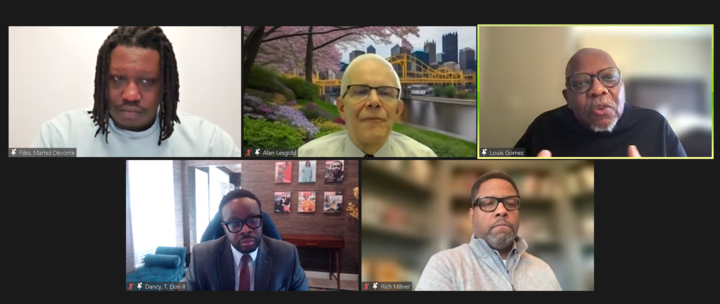Alan Lesgold, the former Renée and Richard Goldman dean of Pitt’s School of Education, founded the Center for Urban Education in 2003. He felt inspired to open the Center out of a feeling of personal responsibility.
“I just couldn’t see being dean of the School of Education in an urban setting and not having the school focus on the problems of schooling, who doesn’t get adequate schooling and how we might change that in an urban setting,” Lesgold said.
The Center for Urban Education celebrated its 20th anniversary Thursday afternoon with a conversation between past and present faculty members on Zoom. Over the past 20 years, the Center has progressed from simple beginnings to today’s technology, combining mentoring and tutoring to advance best practices for urban educators, according to panel moderator Martez Files.
In 2008, Louis Gomez became the Center’s first director. Today, he is a professor at UCLA in the School of Education and Information Studies, but he remembers his time in Pittsburgh as years of important collaboration.
“It was one of the few places I’ve ever been where you had deep connections across universities,” Gomez said. “The same issues that energized many people at the University of Pittsburgh energized colleagues at Carnegie Mellon, and you often had the same intellectual conversation going on within the city.”
Elon Dancy II is the current executive director and chief research scientist of the Center for Urban Education. The Center recently held expert conversations to inform educators about the history of the Gaza Strip, and Dancy emphasized that educators must work to inform themselves to do justice to current events.
“Education institutions have a responsibility to bear witness to the genocide of Indigenous people and their colonial apartheid histories, particularly if they are espousing any commitment to equity and justice,” Dancy said.
After Gomez’s departure, Rich Milner became the second director of the Center. Milner, the Cornelius Vanderbilt chair of education at Vanderbilt University’s Peabody College, said the Center has been particularly important in amplifying the perspectives of groups who may typically go unnoticed.
“We really had to think about what were the needs of the community, what were the needs of the University and how do we deal with those groups’ different capacities,” Milner said.
Dancy said the Center for Urban Education also works to provide high-quality political education through its programming, aligning with the Center’s purpose to positively transform education.
“Our efforts to build political education … were born out of a tradition that has been taught to me through Black knowledge, as it was practiced by figures like Martin Luther King, Jr.,” Dancy said. “But what I found is that when we center on the experiences of oppressed people, particularly Black and Indigenous peoples, we learn more deeply about how state institutions function.”
Dancy further emphasized that through its political education initiatives, participants in the Center’s programming will understand aspects of daily life often accepted as givens.
“[Political education] helps us to understand structures of our life that are just assumed to be normal,” Dancy said. “For instance, poverty, gentrification, apartheid … beg questions for how these realities came to be … and learning the ways in which our struggles are shared globally.”
With the advent of artificial intelligence, the Center for Urban Education has taken a back-to-the-basics approach in redefining its mission, questioning how school curriculums will adapt over the coming years, according to Lesgold.
“Everything that we have in the standard school curriculum is now done better by machines, and we need to think really hard about what it is you need to learn in school to be successful in life,” Lesgold said.
To Dancy, urban education is closely tied to the cultivation of memory, and he said memories played an important role in the Center’s work over the past two decades.
“[Memories] are the subsoil of our work, and they map the connections or the disconnections between us, which helps us to plan for our futures,” Dancy said. “I’m actually not sure that any one of us on this panel could do any research or scholarship without people’s memories.”
Even as the Center adapts new complex initiatives, Gomez said the importance of literacy and math remains constant.
“Literacy always translates into societal benefit,” Gomez said.
Going forward, Dancy hopes to further engage community members as participants while the Center strives for improved methods of educator training to benefit the region.
“I’m really excited about a forthcoming book project with community residents, people who have been longtime fighters and thinkers for educational justice in Pittsburgh,” Dancy said. “In fact, there are more community residents in the books than there are academics.”



